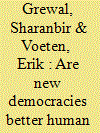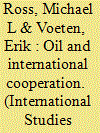| Srl | Item |
| 1 |
ID:
139804


|
|
|
|
|
| Summary/Abstract |
Recent scholarship finds that new democracies are more likely than established democracies to make binding commitments to international human rights institutions. Are new democracies also better at following through on these commitments? Stated differently, does their greater willingness to join international institutions reflect a genuine commitment to human rights reform or is it just “cheap talk?” We analyze this question using a new data set of more than 1,000 leading European Court of Human Rights (ECtHR) cases. Since new democracies face judgments that are more difficult to implement than established democracies, we employ a genetic matching algorithm to balance the data set. After controlling for bureaucratic and judicial capacity, we find that new democracies do implement similar ECtHR judgments initially more quickly than established democracies, but this effect reverses the longer a judgment remains pending. Although new democracies have incentives to implement judgments quickly, they sometimes lack checks and balances that help ensure implementation should an executive resist.
|
|
|
|
|
|
|
|
|
|
|
|
|
|
|
|
| 2 |
ID:
146185


|
|
|
|
|
| Summary/Abstract |
The more that states depend on oil exports, the less cooperative they become: they grow less likely to join intergovernmental organizations, to accept the compulsory jurisdiction of international judicial bodies, and to agree to binding arbitration for investment disputes. This pattern is robust to the use of country and year fixed effects, to alternative measures of the key variables, and to the exclusion of all countries in the Middle East. To explain this pattern, we consider the economic incentives that foster participation in international institutions: the desire to attract foreign investment and to gain access to foreign markets. Oil-exporting states, we argue, find it relatively easy to achieve these aims without making costly commitments to international institutions. In other words, natural resource wealth liberates states from the economic pressures that would otherwise drive them toward cooperation.
|
|
|
|
|
|
|
|
|
|
|
|
|
|
|
|